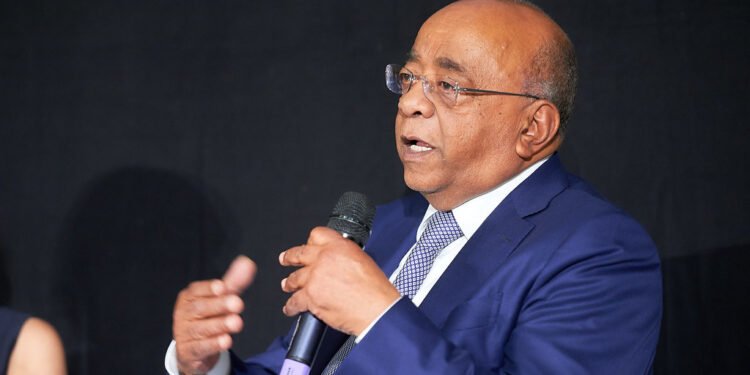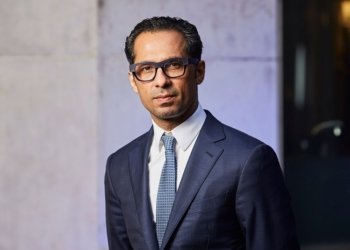Mo Ibrahim is a successful figure in African business. He was born in Sudan and later moved to the UK. Starting as a telecommunications specialist, he became a billionaire mogul, His focus was on expanding mobile communications in Africa.
Ibrahim transformed Celtel into a powerhouse, serving millions. He is known for his commitment to transparency, fight against corruption, and dedication to innovation.
Mo Ibrahim’s story is one of success in African business.
Early Life of Mo Ibrahim
Growing Up in Sudan
Mohamed Salah grew up in Sudan. He valued education and learning since childhood.
Mo Ibrahim, from Alexandria University, Egypt, also emphasized the importance of knowledge early on.
Salah’s upbringing influenced his academic achievements, obtaining a master’s from the University of Bradford and a Ph.D. from the University of Birmingham in Mobile Communications.
His Sudanese background instilled perseverance and determination, seen in founding Celtel, a telecom company that transformed Africa’s industry.
Salah’s childhood shaped his dedication to governance and leadership, leading to the establishment of the Mo Ibrahim Foundation and the Mo Ibrahim Prize for African Leadership.
His experiences molded his commitment to Africa’s progress, focusing on empowering youth and future leaders through scholarship programs at various institutions.
Family Influence
Mo Ibrahim’s family had a big impact on his early life. His parents, Fathi and Aida, valued education, especially his mother. They lived in Sudan and later in Egypt, where education and academic success were important. This environment motivated Mo Ibrahim to do well in school and later pursue a career in electrical engineering.
Today, Mo Ibrahim’s personal values reflect those of his family. The focus on education and intellectual curiosity during his upbringing shaped his belief in the power of knowledge and continuous learning. The support from his family also motivated him to make a positive impact, particularly within the African community. This led him to establish the Mo Ibrahim Foundation, which works on good governance and leadership in Africa. His family’s influence continues to guide his values and beliefs.
Education and Career
Pursuing Higher Education
When pursuing higher education, individuals should consider factors like career goals, areas of interest, and the reputation of the educational institution.
Obtaining a degree from renowned universities, such as the University of Birmingham or London Business School, can enhance knowledge, skills, and credibility in specific fields. This can lead to career advancement and personal growth, opening up opportunities for promotions, salary increases, and networking with industry professionals.
Scholarships from organizations like the Mo Ibrahim Foundation and initiatives like the Now Generation Network can offer financial support for higher education, highlighting the importance of education in achieving goals.
Higher education can provide specialized knowledge in areas like governance, crucial for making a positive impact in communities or aspiring to leadership positions.
Participating in webinars, surveys, and guest blogs on topics like financing Africa can provide valuable insights and help individuals stay informed about current issues and trends in their field.
Professional Journey
Mohamed Salah’s career has been shaped by significant milestones.
He founded Celtel, a telecommunications company that expanded to 14 African countries.
Celtel served over 24 million mobile phone subscribers.
His success with Celtel led to the creation of the Mo Ibrahim Foundation.
The foundation focuses on leadership and governance in Africa.
It established the Ibrahim Index of African Governance.
Salah also initiated the Mo Ibrahim Prize for Achievement in African Leadership.
This award recognizes leaders who promote security, health, education, and economic development in their countries.
Additionally, he supports educational opportunities.
Salah provides scholarships to the University of Birmingham, SOAS, and London Business School.
The goal is to empower African youth and future leaders through education.
Facing challenges, Mo Ibrahim encountered resistance from established telecom companies.
They doubted his proposal to develop mobile communications in Africa.
Despite skepticism, he overcame obstacles.
Salah focused on prepaid cards for affordability and addressed infrastructural issues.
He also implemented anti-corruption measures within Celtel.
By prioritizing ethical business practices, community engagement, and employee welfare, Salah mitigated risks.
He built a successful company that significantly impacted Africa’s economy and connectivity.
Mo Ibrahim Foundation
Vision and Mission
The Mo Ibrahim Foundation was created by Mo Ibrahim. The foundation wants African governance and leadership to improve.
They have two main projects: the Mo Ibrahim Prize for Achievement in African Leadership and the Ibrahim Index of African Governance. These projects aim to celebrate great political leadership in Africa and evaluate how well countries are governed.
The foundation’s goal is to address global issues with an African perspective. They provide data and analysis to understand these issues across Africa.
The foundation brings together African stakeholders to talk about solutions based on good leadership and governance.
Their vision and mission guide their goals and decisions. They also support future African leaders through scholarships at different universities.
The foundation is dedicated to enhancing governance and leadership in Africa.
Impactful Initiatives
Mo Ibrahim founded the Mo Ibrahim Foundation and started the Mo Ibrahim Prize for Achievement in African Leadership. The goal is to improve governance and leadership in Africa and honor exceptional political leadership. The foundation produces the Ibrahim Index of African Governance, which evaluates how well the 54 African countries are governed.
It also offers scholarships at the University of Birmingham, SOAS, and London Business School in topics like International Development and Governance of Development in Africa. Initiatives like the Ibrahim Governance Weekend and the Now Generation Network (NGN) bring stakeholders together and support future African leaders.
These efforts aim to promote good governance, foster strong leadership, and empower African youth. The Mo Ibrahim Prize encourages leaders to provide security, health, education, and economic development by recognizing outstanding achievements. Scholarships provided by the foundation enhance the knowledge and skills of African students, preparing them to lead positive changes in their communities. The Ibrahim Index of African Governance helps evaluate and enhance governance, leading to more accountable and transparent governments. These initiatives address critical challenges in Africa, working towards a prosperous and sustainable future for the continent.
Activities and Contributions
Supporting African Governance
Organizations like the Mo Ibrahim Foundation are important for supporting African governance. They provide data, analysis, and initiatives to assess challenges at a continental level. These efforts include programs such as the Mo Ibrahim Prize for Achievement in African Leadership and the Ibrahim Index of African Governance, which aim to promote good governance and leadership development across African countries.
Collaborations with stakeholders, including youth, are also essential. Initiatives like the Now Generation Network , scholarships at institutions like the University of Birmingham and SOAS, and partnerships with organizations like the London Business School play a key role in nurturing Africa’s future leaders.
Events like the Ibrahim Governance Weekend (IGW) and webinars on topics like financing Africa bring stakeholders together to address the needs of African countries, promote transparency, and strengthen governance practices for sustainable development and effective leadership.
Promoting Leadership Development
Organizations like the Mo Ibrahim Foundation offer scholarships for International Development and Governance of Development in Africa at universities such as the University of Birmingham and SOAS.
They also host the Ibrahim Governance Weekend for stakeholders to discuss important issues in Africa. The Mo Ibrahim Prize for African Leadership recognizes outstanding political leadership on the continent.
Mentorship and coaching programs provide personalized guidance for leadership development. Partnerships, forums, and webinars like “Financing Africa: Where is the Money?” address financial challenges in leadership development, supporting Africa’s youth and future leaders.
Awards and Honours
Recognitions for Philanthropy
Mo Ibrahim is known for his charitable work through initiatives such as the Mo Ibrahim Foundation and the Mo Ibrahim Prize for Achievement in African Leadership. The foundation focuses on enhancing governance and leadership in Africa, offering scholarships at institutions like the University of Birmingham, SOAS, and London Business School.
By supporting better governance in African countries, Mo Ibrahim has had a significant impact on improving communities, particularly where mobile communications were limited. The scholarships provided by his foundation empower African students to make positive contributions to society. Mo Ibrahim’s philanthropic endeavors have been celebrated with awards like the BNP Paribas Prize for Philanthropy and the Clinton Global Citizen Award. He has also been featured in publications such as Time Magazine, recognizing his work in promoting African leadership and development.
Accolades for Business Acumen
1. Mohamed Salah has earned multiple awards for his business and philanthropic work.
- He received the Mo Ibrahim Prize for Achievement in African Leadership and was named in TIME magazine’s “Top 100” list in 2008.
- Salah topped the annual Powerlist of influential Black Britons.
- He has appeared on esteemed lists like New African’s Most Influential Africans and Bloomberg Market’s 50 Most Influential.
- Various academic institutions have granted him honorary degrees, including the University of Birmingham and London Business School.
2. Mo Ibrahim’s business decisions and strategies are celebrated through the Mo Ibrahim Foundation’s initiatives.
- The Foundation oversees the Ibrahim Index of African Governance, which assesses nations’ governance performance.
- Ibrahim’s leadership at Celtel, operating in numerous African countries, reflects his expertise in the mobile communications industry.
- His skills in raising capital, recruiting experienced board members, and addressing corruption risks in Africa are acknowledged.
- Emphasizing transparency, integrity, and community impact, Ibrahim is respected in African business and governance circles.
Personal Life of Mo Ibrahim
Balancing Work and Family
Individuals can balance work and family by setting boundaries and priorities. This includes creating a schedule for work and quality time with family.
Employers can help by offering flexible work arrangements like remote work or flexible hours. This helps employees manage personal responsibilities.
Technology plays a role in achieving work-life balance. Remote communication tools help individuals stay connected with work and family.
For instance, mobile phones help with managing work tasks and staying in touch with colleagues during family events or household duties.
Using technology, individuals can handle work and family commitments without feeling overwhelmed.
Building a Business
Entrepreneurial Ventures
Mohamed Salah had successful entrepreneurial ventures in Africa, particularly with Celtel. His vision for mobile communications in underserved African countries tapped into the demand for mobile phones. He focused on countries like Uganda and Gabon, offering prepaid cards for cellular service at affordable prices to reach low-income consumers.
Salah established credibility by enlisting experienced board members and acquiring licenses through open bidding processes. This commitment to ethical practices built Celtel’s reputation for integrity and reliability.
He also engaged with stakeholders like local communities and employees, providing training, health benefits, and supporting infrastructure development. This approach not only built a successful company but also invested in the well-being and growth of the regions where Celtel operated.
Establishing Credibility
Building Trust and Reputation
Building trust and reputation is important in personal and professional settings. You can do this by being credible, transparent, and reliable. Upholding ethics and showing consistency in your actions help others trust you.
For example, Egyptian footballer Mohamed Salah gained a strong reputation through his great performance and dedication. In business, Mo Ibrahim earned trust by having experienced board members vouch for him. Providing quality service, keeping promises, and sticking to values also boost reputation. Creating real connections with stakeholders and partners, like the Mo Ibrahim Foundation working with London Business School and University of Birmingham, strengthens trust. By nurturing relationships, offering scholarships, and participating in events, individuals can build lasting connections that help their reputation and success grow.
Building the Network
Creating Strong Connections
Creating strong connections with others can be achieved through various strategies.
One effective way is by establishing credibility.
This approach was seen in Mohamed Salah’s launch of Celtel in Africa.
By recruiting an experienced board and setting strict anti-corruption rules, Salah gained trust from regulators and stakeholders, ultimately building a reputable company.
Providing value to the community, such as offering scholarships at the University of Birmingham and SOAS, can foster strong connections and support from the local population.
Engaging in transparent and ethical business practices, like only accepting licenses won through open bidding processes, can help build trust with governments and partners, leading to lasting connections.
To maintain and nurture these relationships over time, it is essential to prioritize the needs of stakeholders and continuously engage with them.
Initiatives like webinars, surveys, and guest blogs can assess and address their evolving needs in the African telecom landscape.
This long-term commitment to understanding and fulfilling the needs of partners and the community is crucial for sustaining strong connections built on trust and mutual benefit.
Finding the Money
Mo Ibrahim used different sources of funds to support his projects. He began with money from his firm, MSI. Later, he gathered $415 million in five years for his mobile company, Celtel. Getting this capital was tough because banks saw Africa as risky. They asked for a lot as collateral. But Ibrahim opted for an IPO on London Stock Exchange. This move paid off when he sold Celtel for $3.4 billion to Zain. It showed his smart thinking and determination amid financial challenges.
FAQ
Who is Mo Ibrahim?
Mo Ibrahim is a Sudanese-British billionaire businessman and philanthropist known for founding the Mo Ibrahim Foundation, which promotes good governance and leadership in Africa through the Ibrahim Index of African Governance.
What is the story of Mo Ibrahim’s success?
Mo Ibrahim’s success story is built on his innovative approach to telecommunications in Africa through founding companies like Celtel and investing in infrastructure. He also established the Mo Ibrahim Foundation to promote good governance and leadership in Africa.
What are some key accomplishments of Mo Ibrahim?
Mo Ibrahim established the Mo Ibrahim Foundation to promote good governance and leadership in Africa. He also created the Ibrahim Index of African Governance to measure and rank governance performance in African countries.
How has Mo Ibrahim contributed to society?
Mo Ibrahim has contributed to society by establishing the Mo Ibrahim Foundation which promotes good governance and leadership in Africa through the Ibrahim Index of African Governance and the Ibrahim Prize for Achievement in African Leadership.
What lessons can be learned from Mo Ibrahim’s success?
Lessons from Mo Ibrahim’s success include setting clear goals, staying persistent, adapting to challenges, and giving back to society. For example, he established the Mo Ibrahim Foundation to promote good governance in Africa, showcasing the importance of using success to create positive change.






